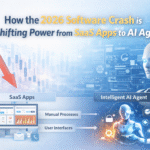AI-powered applications are reshaping cryptocurrency and blockchain in 2025 by making trading, DeFi, and security systems faster and more automated. This guide breaks down what these AI tools actually do, where they help, and where the risks start to show.
Key takeaways
- AI trading agents can spot patterns, sentiment shifts, and arbitrage faster than humans — but they also increase the risk of herd-like market moves.
- Decentralized AI marketplaces make AI models easier to share and monetize, yet scaling and network costs remain real friction points.
- AI security tools can detect fraud and smart contract loopholes, but biased training data can create blind spots.
- 2026 trend is moving toward more “agentic” automation in DeFi, with stronger attention on transparency, auditability, and risk controls.
The fusion of artificial intelligence (AI) and blockchain technology is driving a transformative wave in the cryptocurrency space in 2025. AI-powered applications are enhancing the efficiency, security, and accessibility of blockchain systems, paving the way for innovative solutions across trading, decentralized finance (DeFi), and data management. From AI-driven trading agents to decentralized AI marketplaces, these advancements are reshaping how users interact with digital assets.
This article explores the latest trends in AI-powered applications within cryptocurrency and blockchain, highlighting their potential and the challenges they present.
AI-Driven Trading Agents: Smarter Crypto Strategies
AI-powered trading agents are revolutionizing cryptocurrency markets by automating complex trading strategies. Platforms like Numerai, which operates as a hedge fund, leverage decentralized intelligence and machine learning to predict stock market movements, extending similar capabilities to crypto trading. These agents analyze vast datasets—market trends, sentiment analysis, and economic indicators—to execute trades with precision.
For instance, a recent post on X highlighted how AI agents can monitor liquidity pools across blockchains like Ethereum and Solana, seizing arbitrage opportunities faster than any human trader. However, this automation raises concerns about market manipulation, as collective AI actions could influence liquidity and trading patterns, potentially destabilizing smaller markets.
Are AI trading agents safe for beginners?
They can help automate decisions, but they also amplify risk if you don’t understand what the agent is optimized for. Treat them as “tools,” not guaranteed profit machines.
Key takeaway: The strongest AI agents win on speed and pattern-detection — but the moment too many agents chase the same signal, volatility can spike.
Explore real-world consumer adoption trends in taobao and dhgate dominate us app store rankings.
Decentralized AI Marketplaces for Blockchain
Decentralized AI marketplaces are another significant trend, enabling developers to create, share, and monetize AI models on the blockchain. SingularityNET, a pioneer in this space, supports interoperability among diverse AI applications, allowing smaller players to compete with tech giants. In 2024, SingularityNET merged with Fetch.ai and Ocean Protocol to form the Artificial Superintelligence Alliance (ASI), consolidating their tokens into a unified ASI token by July 2024.
This alliance now facilitates over 3.5 million transactions across multiple blockchains, offering services like NFT valuations and DeFi trading strategies. While this democratization of AI resources is promising, the reliance on blockchain for data sharing could strain network scalability, especially as transaction volumes grow.
What problem do decentralized AI marketplaces solve?
They reduce reliance on a few centralized AI providers by allowing more open model-sharing, payments, and interoperability — but they still depend on network performance and adoption.
Key takeaway: Decentralized marketplaces are exciting because they widen access — but scalability and cost remain the “make or break” factor. ASI merger guide
Enhancing Blockchain Security with AI
AI is playing a crucial role in bolstering blockchain security, a pressing need as adoption accelerates. Multi-agent AI systems, powered by cloud GPUs, monitor blockchain transactions in real-time to detect fraud, money laundering, and vulnerabilities. For example, platforms like Oraichain, which launched the world’s first AI-powered oracle platform in 2021, use AI to analyze smart contract loopholes, preventing incidents like the $50 million DAO hack of 2016.
Binance, a leading crypto exchange, has also integrated AI into its risk management system, safeguarding users from fraud with advanced detection models. Despite these advancements, the narrative that AI guarantees security oversimplifies the issue—AI models can be biased or manipulated if trained on flawed data, potentially introducing new risks.
Can AI prevent hacks completely?
No. AI improves detection and reduces response time, but security still depends on strong code audits, access controls, and safe user behavior.
AI and Blockchain in DeFi: Optimizing Financial Systems
Decentralized finance (DeFi) is benefiting immensely from AI-powered applications. AI agents optimize DeFi protocols by managing liquidity pools, predicting market movements, and automating yield farming strategies. NEAR Protocol, for instance, introduced NEAR Intents in 2024, enabling seamless interactions between AI agents and DeFi services for asset exchanges. This has contributed to NEAR’s market cap exceeding $6.7 billion by November 2024.
However, the automation of DeFi processes raises ethical questions—such as accountability for AI-driven financial losses—and regulatory challenges, as decentralized systems often operate outside traditional oversight frameworks, potentially exposing users to unforeseen risks. AI also intersects with CBDC growth in 2025, offering solutions for secure digital currency transactions.
Who is responsible if an AI agent loses money in DeFi?
That’s one of the biggest unresolved issues. Responsibility can be unclear across developers, users, and protocols — which is why transparency and controls matter.
Challenges and Ethical Considerations
While AI-powered applications in cryptocurrency and blockchain offer significant benefits, they come with challenges. Privacy concerns arise as AI agents require vast amounts of data, which, even when tokenized on a blockchain, could be vulnerable to breaches if not properly secured. Additionally, the environmental impact of running AI models on energy-intensive blockchains remains a concern, despite efforts by projects like Matrix AI Network to prioritize sustainability.
The narrative that AI and blockchain will seamlessly solve all crypto-related issues ignores these complexities, as well as the potential for AI to exacerbate inequalities if access to these technologies remains uneven.
Is crypto AI bad for the environment?
It depends on the chain, compute method, and scale. The risk increases when high compute AI runs on energy-heavy infrastructure without efficiency controls.

The Road Ahead for AI and Blockchain Integration
The integration of AI and blockchain in cryptocurrency is set to deepen in 2025, with platforms like Olas leading the charge through decentralized agent app stores like Pearl, processing over 700,000 transactions monthly. These advancements promise a more efficient and secure crypto ecosystem, but they also demand careful consideration of ethical, regulatory, and environmental implications.
By addressing these challenges, AI-powered applications can truly unlock the potential of blockchain, offering a smarter, more inclusive future for digital finance.
Understand the next evolution of blockchain in decentralized applications dapps and web3.
Going into 2026, the biggest shift is that “agentic” automation is becoming more common — but the winners will be the systems that make AI decisions more transparent, easier to audit, and safer for everyday users (not just experts).





